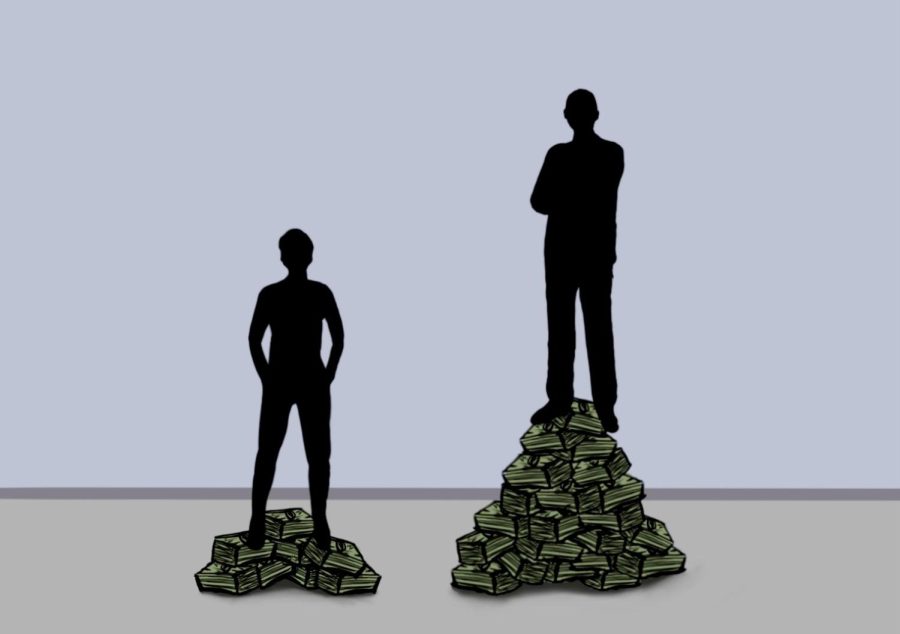Why Spotify’s Pay Structure Is Unfair to Artists
Even though one million monthly listeners on Spotify barely make artists a living wage, hardly any pressure has been put on the streaming service.
February 8, 2023
If you’ve ever taken a trip to your local record store, you may have noticed the high prices of the albums that fill the store’s shelves. At best, a CD will set you back $9.99, while a vinyl record can be up to $50.
Meanwhile, Spotify Premium costs $9.99 per month, giving you access to millions of songs and thousands of albums…for the cost of one CD per month. How is Spotify able to charge such a low price for their service?
Unfortunately, their methods for providing this service aren’t exactly fair to artists.
Shocker.
According to USA Today, Spotify does not directly pay artists. Instead, they use a system called “stream share,” which allows for variation in pricing due to licensing agreements. Stream share is calculated by taking the sum of streams of music owned by a rights holder in a specific country and dividing them by the number of streams in their genre.
A rights holder, in this case, can be either an indie artist, who owns and has full control over their musical rights, or it can be a record label that an artist signs to.
On average, as of 2020, artists make around a third of a cent per stream. When Vince Staples said, “Listen to your favorite album 1,000, 2,000 times so everybody can get an album sale,” he may have been generous — a third of a cent per stream means that an artist would need 3,000 streams to get a single album sale.
This also means that an artist, solely through Spotify, would need around 800,000 monthly streams to make a $15 per hour minimum wage.
Which begs the question: if 800,000 streams only make you minimum wage, what about smaller and up-and-coming artists? That is the main issue with Spotify’s current artistic revenue system — smaller and rising artists have almost no share of the revenue generated by their music.
Additionally, smaller artists won’t have the media attention to get huge endorsement deals or the fanbase to be able to book arena shows, leaving streams and possibly merchandise as their most likely sources of income. Given the unfavorable pay structure of Spotify and services like it, this can make money extremely tight.
So how can we help?
The most obvious way to support your favorite artists is by buying physical copies or MP3 downloads of their music, as this puts the most money in their pockets if we’re talking strictly about music. Buying merchandise is a very effective way to support artists financially. Going to see them live in concert is another option for how to support artists, as concerts and shows are one of the biggest sources of artist revenue.
I would also encourage you to cancel your Spotify subscription as the vast majority of music available on Spotify is also available for free on YouTube. While I would imagine most people would prefer to use a service such as Spotify to stream their music, the sad reality is that Spotify likely won’t change its pay structure unless its users put pressure on the platform. The most direct form of protest against Spotify’s pay structure is boycotting, which takes money out of their pocket.
If Spotify, the biggest audio streaming company, revamps its pay structure, it will set a precedent for the rest of the industry. It’s time for us as listeners to get artists their fair share.






Thomas Wasyluka • Nov 17, 2023 at 11:12 am
Just finished watching “The Playlist” on NETFLIX. Got me searching, found this very good article. 475ish, total complete albums from iTunes, nearly every album downloaded complete. My feelings are even your weakest songs help me know you.
Outside of my classical albums my collection goes back at least as far as CHESS Records, now up to Taylor Swift re-recording her life work. She might not need the money now, but the stand she’s taken needs to be respected. My wife uses spotify, initially w ads, now the more expensive subscription. Won’t do it. I’ve seen royalty checks, my wife’s dad played with the Philadelphia Orchestra. Until his death in 2010 these little bitty checks came in. He left the orchestra in 1967, after leading the strike that created the union, & the 1st full year contract. He fought for musicians, I hope you can help with this newer issue. Thanks, Thomas WasylukaArian